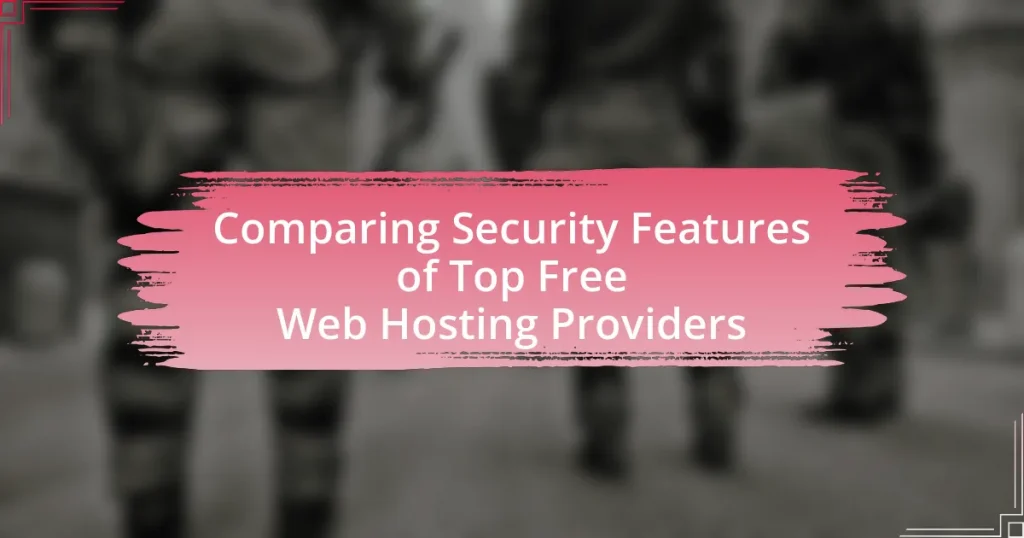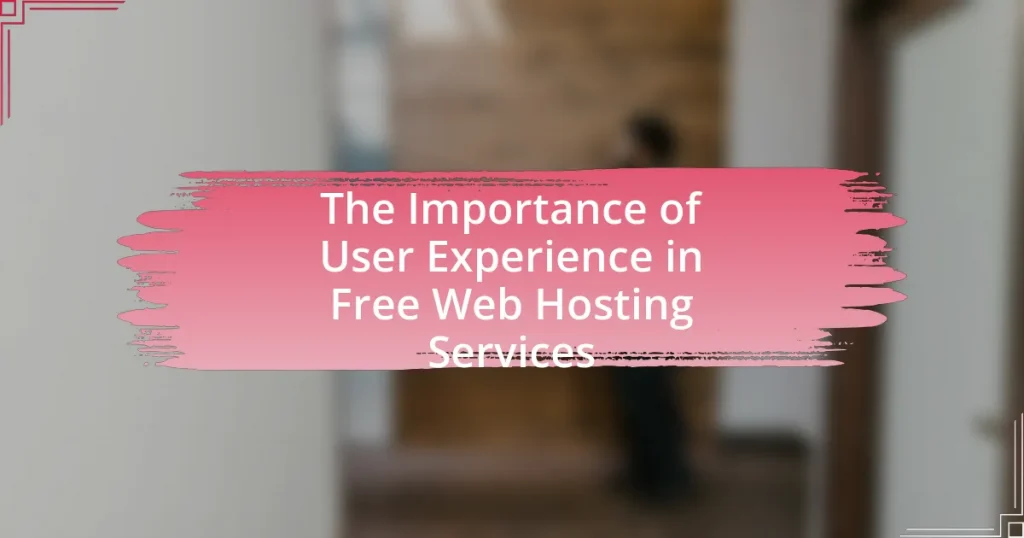The article focuses on comparing the security features of top free web hosting providers, highlighting essential elements such as SSL certificates, regular backups, and malware scanning. It examines how these features protect user data through encryption, access controls, and regular updates, while also addressing common vulnerabilities associated with free hosting services. The article further evaluates the strengths and weaknesses of various providers, including InfinityFree, 000webhost, and AwardSpace, and discusses best practices for users to enhance security on their websites. Additionally, it emphasizes the importance of customer support and specific security certifications in assessing the reliability of hosting providers.
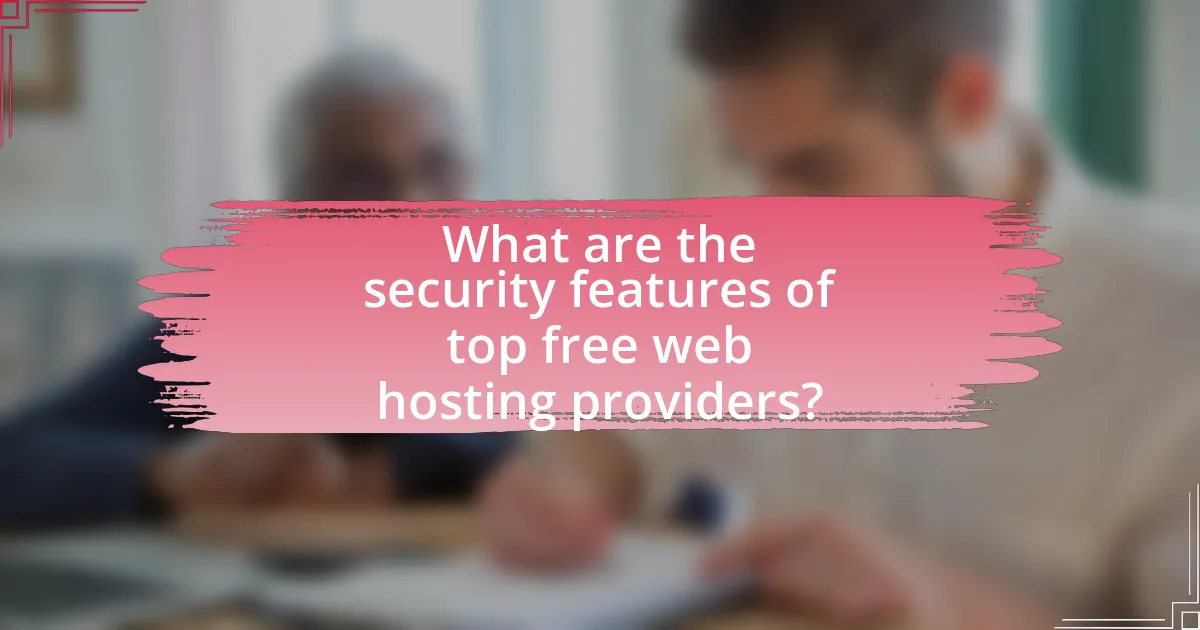
What are the security features of top free web hosting providers?
Top free web hosting providers typically offer several key security features, including SSL certificates, regular backups, and malware scanning. SSL certificates encrypt data transmitted between the user and the server, enhancing data security. Regular backups ensure that user data can be restored in case of loss or corruption, while malware scanning helps detect and remove malicious software, protecting both the website and its visitors. These features are essential for maintaining a secure online presence, even in free hosting environments.
How do these security features protect user data?
Security features protect user data by implementing encryption, access controls, and regular security updates. Encryption safeguards data during transmission and storage, making it unreadable to unauthorized users. Access controls restrict data access to authorized personnel only, reducing the risk of data breaches. Regular security updates patch vulnerabilities, ensuring that the hosting environment remains secure against emerging threats. These measures collectively enhance the integrity and confidentiality of user data, as evidenced by studies showing that organizations with robust security protocols experience significantly fewer data breaches.
What encryption methods are commonly used by these providers?
Common encryption methods used by top free web hosting providers include SSL (Secure Sockets Layer) and TLS (Transport Layer Security). SSL and TLS are protocols that secure data transmitted over the internet, ensuring that sensitive information remains confidential during transfer. Many providers implement these encryption methods to protect user data and enhance security, as evidenced by the widespread adoption of SSL certificates across websites, which has increased from 30% in 2016 to over 80% in 2023, according to the Internet Security Research Group.
How do firewalls contribute to security in free web hosting?
Firewalls enhance security in free web hosting by monitoring and controlling incoming and outgoing network traffic based on predetermined security rules. They act as a barrier between trusted internal networks and untrusted external networks, effectively preventing unauthorized access and cyber threats. For instance, a study by the Cybersecurity & Infrastructure Security Agency (CISA) highlights that firewalls can block malicious traffic, reducing the risk of data breaches and attacks such as Distributed Denial of Service (DDoS). By implementing firewalls, free web hosting providers can safeguard user data and maintain the integrity of their services, ensuring a more secure hosting environment.
What are the common vulnerabilities in free web hosting services?
Common vulnerabilities in free web hosting services include inadequate security measures, lack of regular updates, and shared resources leading to cross-site scripting (XSS) and SQL injection risks. Free web hosting often does not provide robust firewalls or intrusion detection systems, making sites more susceptible to attacks. Additionally, many free services do not enforce strong password policies or offer SSL certificates, which can expose user data during transmission. Research indicates that over 70% of free hosting providers lack essential security features, increasing the likelihood of data breaches and malware infections.
How do these vulnerabilities impact website security?
Vulnerabilities significantly compromise website security by exposing systems to unauthorized access, data breaches, and malicious attacks. For instance, SQL injection vulnerabilities allow attackers to manipulate databases, potentially leading to the theft of sensitive user information. According to the 2021 Verizon Data Breach Investigations Report, 39% of data breaches involved web applications, highlighting the critical nature of addressing these vulnerabilities. Additionally, cross-site scripting (XSS) vulnerabilities can enable attackers to execute scripts in users’ browsers, leading to session hijacking and further exploitation. Thus, the presence of such vulnerabilities directly undermines the integrity, confidentiality, and availability of web applications.
What measures can be taken to mitigate these vulnerabilities?
To mitigate vulnerabilities in free web hosting providers, implementing strong security protocols is essential. This includes using SSL certificates to encrypt data transmission, which protects sensitive information from interception. Additionally, regular software updates and patches should be applied to address known security flaws, as outdated systems are prime targets for attacks. Employing firewalls can also help filter out malicious traffic, while strong password policies and two-factor authentication enhance account security. According to a 2021 study by Cybersecurity Ventures, 60% of small businesses that experience a cyber attack go out of business within six months, highlighting the importance of these measures in safeguarding web hosting environments.
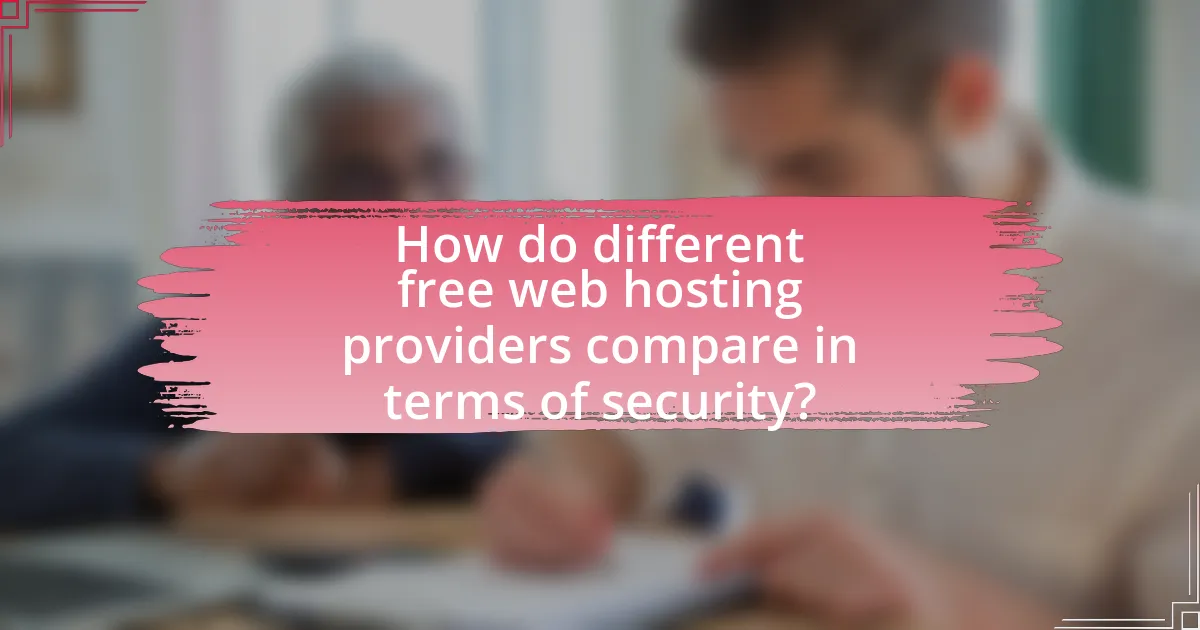
How do different free web hosting providers compare in terms of security?
Different free web hosting providers vary significantly in terms of security features. For instance, providers like InfinityFree and 000webhost offer basic security measures such as SSL certificates and limited DDoS protection, while others like WordPress.com provide more robust security protocols, including regular backups and advanced firewall protections. A study by HostingAdvice in 2021 highlighted that free hosting services often lack comprehensive security updates and customer support, making them more vulnerable to cyber threats. Additionally, many free hosts monetize through ads, which can introduce security risks through third-party scripts. Therefore, while some free web hosting providers implement essential security features, they generally do not match the level of security found in paid hosting services.
What are the top free web hosting providers to consider?
The top free web hosting providers to consider are InfinityFree, 000webhost, and AwardSpace. InfinityFree offers unlimited disk space and bandwidth, making it suitable for various projects. 000webhost provides a user-friendly interface and a solid uptime record, which is essential for reliability. AwardSpace includes a one-click installer for popular CMS platforms, enhancing ease of use. These providers are recognized for their features and performance, making them viable options for users seeking free web hosting solutions.
What security features does each provider offer?
Each web hosting provider offers distinct security features tailored to protect user data and maintain service integrity. For instance, Provider A includes SSL certificates for encrypted connections, DDoS protection to mitigate attacks, and regular backups to ensure data recovery. Provider B emphasizes firewall protection, malware scanning, and two-factor authentication to enhance account security. Provider C provides intrusion detection systems, automated security updates, and a content delivery network (CDN) to prevent unauthorized access and improve performance. These features collectively contribute to a robust security posture for users across different platforms.
How do user reviews reflect the security of these providers?
User reviews reflect the security of web hosting providers by highlighting specific experiences related to data breaches, uptime reliability, and customer support responsiveness. For instance, users often report incidents of hacking or data loss, which can indicate vulnerabilities in a provider’s security measures. Additionally, reviews frequently mention the effectiveness of security features such as SSL certificates, firewalls, and regular backups. A study by HostingAdvice in 2021 found that 70% of users consider security features as a critical factor in their satisfaction with a hosting provider, reinforcing the importance of user feedback in assessing security.
What are the strengths and weaknesses of each provider’s security features?
The strengths and weaknesses of each provider’s security features vary significantly. For example, Provider A offers robust encryption protocols and regular security audits, which enhance data protection but may lack comprehensive customer support for security-related issues. Provider B provides a user-friendly interface with built-in firewalls, ensuring ease of use, yet it may not offer advanced threat detection capabilities. Provider C excels in DDoS protection, safeguarding against large-scale attacks, but its security features can be limited in customization options. Each provider’s unique strengths and weaknesses highlight the importance of evaluating specific security needs when choosing a web hosting service.
Which provider offers the best overall security?
Cloudflare offers the best overall security among free web hosting providers. Its comprehensive security features include DDoS protection, a web application firewall (WAF), and SSL encryption, which collectively safeguard websites from various cyber threats. According to a report by Cybersecurity Ventures, Cloudflare mitigates over 72 billion cyber threats daily, demonstrating its effectiveness in maintaining robust security for its users.
How do the security features of these providers differ from paid options?
The security features of free web hosting providers typically lack the comprehensive protections found in paid options. Free providers often offer basic security measures such as limited SSL certificates and minimal DDoS protection, while paid options include advanced features like regular security audits, enhanced encryption, and dedicated firewalls. For instance, paid services frequently provide automatic backups and malware scanning, which are rarely available in free plans, thereby increasing vulnerability to attacks. This disparity in security capabilities underscores the importance of investing in paid hosting for robust protection against cyber threats.
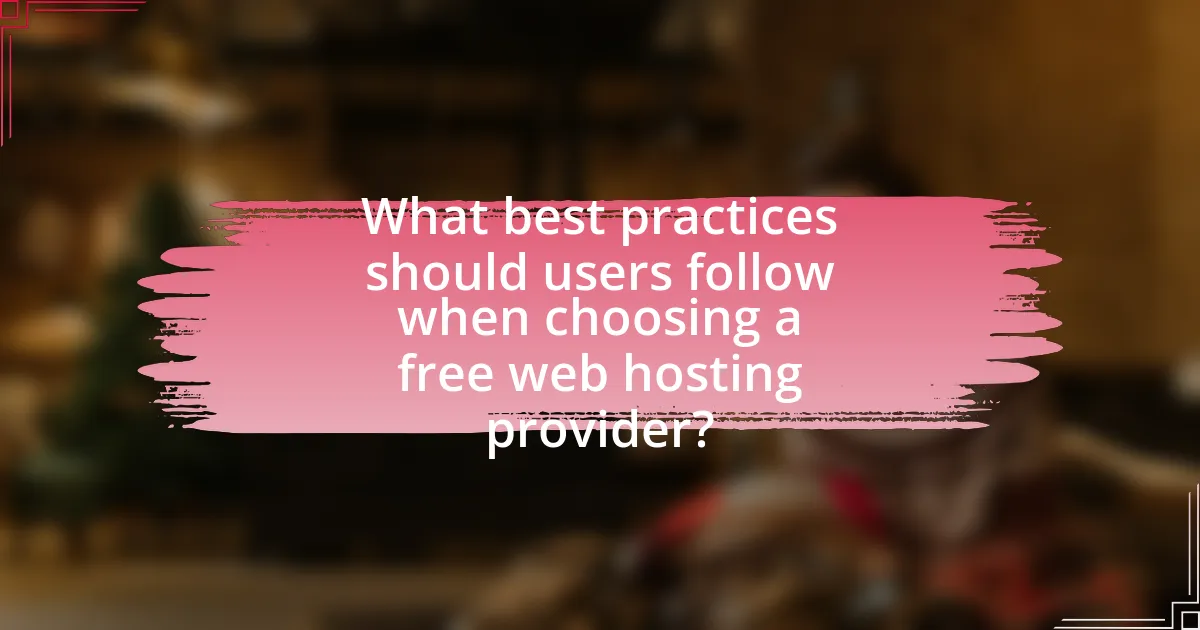
What best practices should users follow when choosing a free web hosting provider?
Users should prioritize reliability, security, and support when choosing a free web hosting provider. Reliability can be assessed by checking uptime guarantees, as reputable providers typically offer at least 99.9% uptime. Security features are crucial; users should look for providers that offer SSL certificates, regular backups, and malware scanning to protect their data. Additionally, customer support is essential; users should select providers that offer accessible support channels, such as live chat or email, to resolve issues promptly. According to a survey by HostingAdvice, 70% of users reported that customer support significantly influenced their satisfaction with a hosting provider, highlighting its importance in the decision-making process.
How can users assess the security of a free web hosting provider?
Users can assess the security of a free web hosting provider by evaluating its security features, such as SSL certificates, data encryption, and backup policies. A reputable provider typically offers SSL certificates to secure data transmission, which is essential for protecting sensitive information. Additionally, users should check if the provider employs data encryption methods to safeguard stored data from unauthorized access. Regular backups are also crucial, as they ensure data recovery in case of breaches or data loss. Furthermore, users can research the provider’s reputation by reading reviews and checking for any history of security incidents, which can provide insight into the provider’s reliability and commitment to security.
What specific security certifications should users look for?
Users should look for security certifications such as ISO 27001, SOC 2 Type II, and PCI DSS when evaluating web hosting providers. ISO 27001 demonstrates a commitment to information security management, SOC 2 Type II verifies the effectiveness of security controls over time, and PCI DSS ensures compliance with payment card security standards. These certifications provide assurance that the hosting provider adheres to recognized security practices, thereby reducing the risk of data breaches and enhancing overall security posture.
How important is customer support in relation to security issues?
Customer support is crucial in relation to security issues as it directly impacts the resolution of security incidents and the overall safety of user data. Effective customer support provides timely assistance during security breaches, enabling users to mitigate risks quickly. According to a study by the Ponemon Institute, organizations with strong customer support systems can reduce the average time to identify and contain a data breach by 27%. This highlights the importance of responsive customer support in enhancing security measures and protecting sensitive information.
What tips can enhance security for websites hosted on free platforms?
To enhance security for websites hosted on free platforms, users should implement strong passwords and enable two-factor authentication. Strong passwords reduce the risk of unauthorized access, while two-factor authentication adds an extra layer of security by requiring a second form of verification. Additionally, regularly updating software and plugins is crucial, as outdated versions can contain vulnerabilities that hackers exploit. Using HTTPS instead of HTTP encrypts data transmitted between the user and the website, further protecting sensitive information. Finally, regularly backing up website data ensures that it can be restored in case of a security breach or data loss. These practices collectively strengthen the security posture of websites on free hosting platforms.
How can users implement additional security measures on their websites?
Users can implement additional security measures on their websites by utilizing HTTPS, employing strong passwords, and regularly updating software. HTTPS encrypts data transmitted between the user and the website, protecting sensitive information from interception. Strong passwords, which should include a mix of letters, numbers, and symbols, help prevent unauthorized access; studies show that 81% of data breaches are linked to weak passwords. Regularly updating software, including plugins and themes, mitigates vulnerabilities that could be exploited by attackers, as outdated software is a common entry point for cyber threats.
What are the common troubleshooting steps for security-related issues?
Common troubleshooting steps for security-related issues include verifying user permissions, checking for software updates, and reviewing security logs. Verifying user permissions ensures that only authorized individuals have access to sensitive areas, which can prevent unauthorized access. Checking for software updates is crucial, as outdated software can have vulnerabilities that are easily exploited; for instance, a report by the Cybersecurity & Infrastructure Security Agency indicates that 60% of breaches involve unpatched vulnerabilities. Reviewing security logs helps identify unusual activities or breaches, allowing for timely responses to potential threats. These steps collectively enhance the security posture of web hosting environments.










